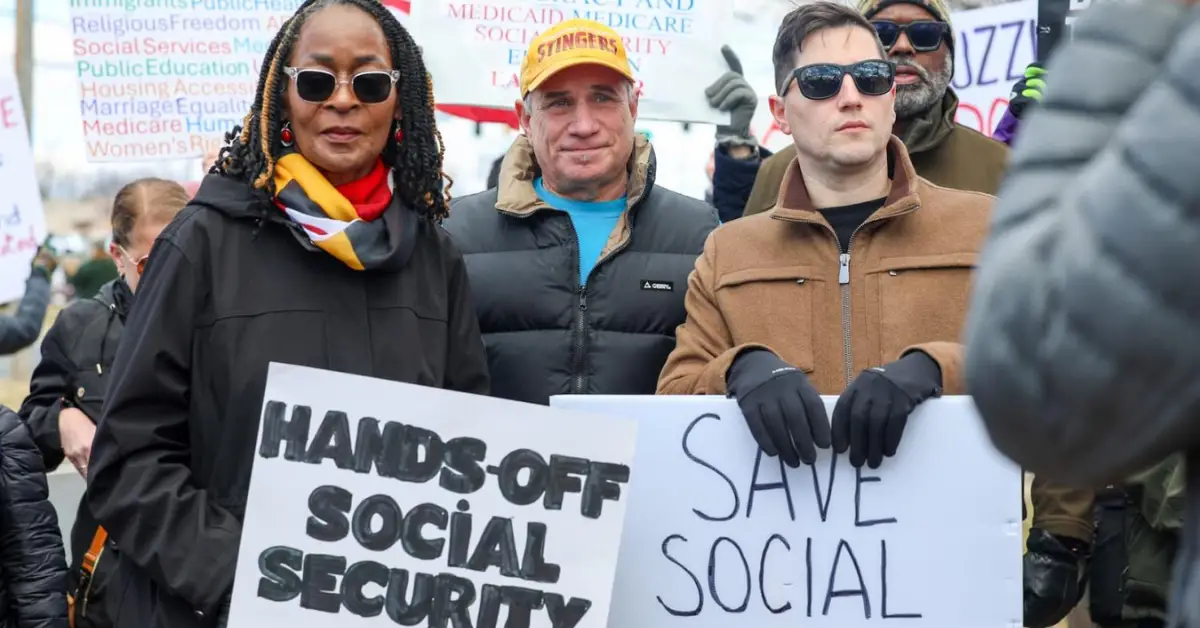Social Security is an essential lifeline for millions of Americans, providing critical financial support for retirees, disabled individuals, and others in need. However, recent changes under the leadership of Elon Musk and the Department of Government Efficiency (DOGE) are causing alarm.
With Musk’s well-known criticisms of Social Security, which he has called “the biggest Ponzi scheme of all time,” the new rule aims to combat fraud but may make accessing benefits more complicated for many people who depend on it.
The Shift in Social Security Policy
One of the most significant changes being implemented by the Department of Government Efficiency (DOGE) is the elimination of phone-based identity verification for Social Security benefits. Currently, millions of beneficiaries use the toll-free number 1-800-772-1213 to verify their identity and manage their benefits over the phone.
However, as of April 14, 2025, this option will no longer be available for most applicants. Instead, beneficiaries will be required to either apply online or visit a local Social Security office in person to complete identity verification and other necessary steps.
This shift is part of a broader effort to reduce fraud in the Social Security system. By removing the phone-based option and requiring online or in-person verification, the Social Security Administration (SSA) hopes to strengthen identity authentication processes.
According to the SSA, this will help ensure that only legitimate beneficiaries receive Social Security benefits. However, critics argue that this change could harm vulnerable groups who rely on the phone-based system, especially in rural areas or among individuals who lack access to technology.
The Digital Divide: Accessibility Issues
While reducing fraud is important, the digital divide presents a significant challenge. For many Americans, the new requirements will create unnecessary barriers to accessing benefits. Kathleen Romig, the director of Social Security and disability policy at the Center on Budget and Policy Priorities, explains that many people, particularly older adults and individuals with disabilities, may struggle with the transition to online applications.
“Not everyone is comfortable using a smartphone, and not everyone has access to the internet,” Romig says. “For a large portion of the population, especially older adults, this new requirement could be an insurmountable obstacle.”

Many seniors, people with disabilities, and others may not have the necessary technology or the skills to navigate online forms. For example, some people may not have a smartphone with a camera to submit required identification photos, which could further complicate the process.
This issue is particularly concerning for people who do not drive and may not have a valid ID. Without a phone option, many people may be left without a clear way to verify their identity and apply for benefits, leading to frustration and delays.
Impact on Rural Americans
Another group that could be severely affected by this change is rural Americans, who often face additional challenges in accessing Social Security offices. For many people in rural areas, the nearest Social Security office may be hours away, requiring them to take long and costly trips to verify their identity. Even for those who have internet access, visiting an office in person could be a difficult and time-consuming process.
Nancy Altman, president of Social Security Works, highlights the strain this new policy places on people in rural areas. “This policy forces people to either go online or make long, difficult trips to a Social Security office. For those with mobility issues or who live far from an office, this is especially hard,” Altman says. This is especially concerning for seniors and individuals with disabilities, who may have difficulty traveling or do not have access to a reliable vehicle.
Exceptions and Exemptions
While the new rule will primarily affect people applying for retirement, survivor, or family benefits, there are some exemptions to the new requirement. The SSA has announced that individuals applying for disability insurance, Medicare, and Supplemental Security Income (SSI) will still be able to apply by phone if they choose. These groups have been given this exception due to concerns about their ability to navigate online applications, especially among seniors and those with disabilities.
However, even with this exemption, the new rules will create challenges for many. While people applying for disability insurance, Medicare, or SSI can continue using the phone system, those applying for other benefits, such as retirement or survivor benefits, will need to either go online or visit a Social Security office in person.
Grieving Families Face Additional Burden
One of the most troubling aspects of the new rule is its impact on grieving families who need to apply for survivor benefits. Currently, families who have lost a loved one can apply for survivor benefits over the phone. However, under the new policy, there will be no online option for applying for survivor benefits. This means that grieving families will be forced to visit a Social Security office in person, which can be especially difficult during a time of mourning.
Kathleen Romig points out the added burden this places on families who are already dealing with the loss of a loved one. “For grieving families, the last thing they need is to be forced to make a trip to a Social Security office just to apply for survivor benefits. This change could cause unnecessary stress and delays,” she says. The new rule may leave these families feeling overwhelmed and unsure of how to navigate the process during a difficult time.
A Controversial Decision
The decision to eliminate phone-based verification and require online or in-person applications has been controversial from the start. Critics argue that the policy is more about cutting costs and reducing staff at the SSA than about protecting the integrity of the system. By eliminating the phone option, the SSA is reducing the need for phone operators, leading to a significant reduction in staffing levels. This raises questions about the true motivations behind the change and whether it will result in better service for the American public.
While the SSA maintains that the new rules will strengthen identity verification and reduce fraud, many are concerned that the changes will only create new barriers for vulnerable populations. For millions of Americans who rely on Social Security benefits, these new requirements could lead to unnecessary hardship and delays in receiving the support they need.
The Future of Social Security
As the implementation of these new rules approaches, many Americans wonder what the future holds for Social Security. Will the changes improve security and prevent fraud, or will they leave millions of beneficiaries struggling to access the benefits they depend on? Only time will tell.
In the meantime, Social Security advocates are urging the SSA to reconsider the policy and find ways to ensure that vulnerable populations are not left behind. For now, beneficiaries should be aware of the upcoming changes and prepare for the shift to online or in-person verification starting on April 14, 2025.
Disclaimer: This article has been meticulously fact-checked by our team to ensure accuracy and uphold transparency. We strive to deliver trustworthy and dependable content to our readers.




